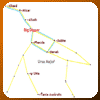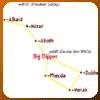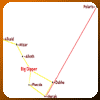You are seeing this message because you are using an out-of-date browser.
Please click here for more information.
The Big Dipper and Ursa Major
Since the Big Dipper is part of the constellation Ursa Major (The Great Bear), it is technically not a constellation. It's what is called an asterism, which is the name given to interesting star patterns that are easily recognizable, but not one of the "official" constellations.
Be that as it may, the Big Dipper is probably one of the first objects in the sky that we learn to find and identify. It's distinctive position at the top of the summer night sky and the graceful curve of its handle make it easy for almost anyone to find.
The link at right will take you to a map of the Ursa Major constellation where you will see where the Big Dipper is in relation to the actual constellation.
The Big Dipper and its Companions
The Big Dipper is very impressive all by itself, but it also is very close to a number of other very interesting sights. Included in these sights, and noted on the map at right, are the Pinwheel galaxy and the Whirlpool galaxy. If you have a good pair of binoculars or a small telescope, you should be able to find these galaxies using the map we have provided. When you find them, they will usually look like a small smudge of light instead of the sharp well-defined light that you are used to seeing when you look at a star.
There are also several double stars in the Big Dipper, which you should be able to see using a small telescope. All in all, the Big Dipper is a very interesting place indeed.
A Compass in the Sky
As you spend more time watching the sky, you will learn that the stars in one constellation can help lead you to other sky landmarks. The Big Dipper is no exception as you can use two of the stars in its "cup" to find the North Star and you can use the arc of its handle to find the giant red star Arcturus.
As the Big Dipper rotates around our north sky "pole", in what is caled a "circumpolar" orbit, two of the stars in its bowl can always ppoint the way to Polaris, the North Star. Although Polaris is not often at exactly North on a compass, it's fairly close and can help you get your directions when you are outside at night.
Terence Dickinson's book "Nightwatch", which we have a link to on the main Constellations page, has many examples of using constellations and their stars to find your way around the night sky. We recommend it highly.
Follow the Drinking Gourd
In the United States, during the nineteenth century, African-Americans that were being held as slaves in the south made very practical use of the Big Dipper's consistent northern sky location. The Big Dipper was also known as the Drinking Gourd and slaves trying to make their way to freedom used it as a guidepost to find their way North and escape the bonds of slavery.
The lyrics of folk song "Follow the Drinking Gourd" served as guide to help them find their way north and its chorus reminded them to always follow the Drinking Gourd, or Big Dipper.
When Can I See the Big Dipper?
The very best time to look at the Big Dipper is in the middle of the summer, when it is easily found on any clear night in the northernmost part of the night sky. Once you are outside, look in the northern sky and try to find it handle. The arc of the handle will stand out and once you have found the handle, finding the bowl is easy. Once you have found the entire Big Dipper, use the charts we have to find Polaris and Arcturus. You will be surprised at how easy it is.
- Chris Dolan's Ursa Major Page
- Chris Dolan's Ursa Major page has lots of technical information about the stars that make up Ursa Major and the Big Dipper.
- Richard Dibon-Smith's Ursa Major Page
- Richard Dibon-Smith's Ursa Major page has an excellent account of the many legends associated with Ursa Major.
- NASA Quest's Follow the Drinking Gourd Page
- The NASA Quest site has a very page explaining the history of the Follow the Drinking Gourd song and legend.
There is an Adobe® Acrobat® file (47k) for The Big Dipper. You can view the file online by clicking
here. You can save the file on your computer by right-clicking on the link.
You will need the free
Adobe® Acrobat® ReaderTM
to view the file.




